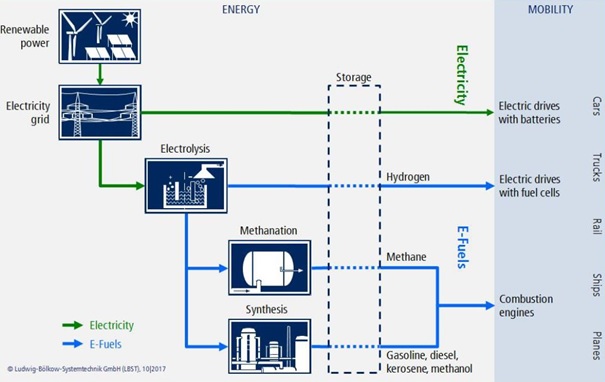In the context of increasing air pollutions in the cities and “Dieselgate,” everybody is talking about electronic vehicles (EV) and hybrid cars. But to be competitive with combustion engines, it is still a long way to go, considering price, distance, infrastructure, etc. Maybe the automotive industry should rethink the entire future of mobility ─ what’s about e-fuels?
Definition of e-fuels
E-fuels are gaseous and liquid fuels such as hydrogen, methane, synthetic petrol and diesel fuels generated from renewable electricity.

E-fuels are one possible technical perspective for a sustainable transformation of the transport sector, along with others such as battery-powered electromobility. But the conversion of vehicle fleets to other drive systems takes time. And even then, we will not be able to completely dispense liquid fuels due to missing infrastructure for power stations or a range of EVs.
Will e-fuels be the solution for all of the problems we are facing at the moment?
E-fuels are not, per se, more climate-friendly than fossil fuels. Their relative climate friendliness depends largely on the question of which electricity mix is used to produce the hydrogen and what effort has to be made to provide the carbon source.
The electricity that is used to produce e-fuels should come as completely as possible from renewable sources and these sources must be installed in the electricity system in addition to the expansion of the renewable electricity generation that is already done.
Under these conditions, e-fuels can contribute to a more sustainable mobility in the context of different technologies. E-fuels allow a different optimization of internal combustion engines and possibly a cleaner combustion. Sounds like the perfect solution.
Advantages and disadvantages of e-fuels:
- The entire petrol/diesel/gas infrastructure (gas stations, pipelines, etc.) can still be used.
- E-fuels have a high-energy density and can, therefore, be transported conveniently over long distances.
- The overall energy efficiency of electricity use in battery EVs is four to six times, and via hydrogen fuel cell vehicles, about two times higher than e-fuels in combustion engines.
- E-fuels require an additional massive expansion of renewable power generation and capacity building. This is a massive investment, which is unreasonable without secure conditions for the use of e-fuels.
- In addition, it can be assumed that e-fuels will be significantly more expensive than currently comparable fossil fuels. So, it will be difficult to achieve acceptance because customers, even today, are not willing to pay more for EVs.
Need for action:
- Policy makers and the industry will need to develop a strategic agenda for technology research, market development and regulation of e-fuels.
- E-fuels will be crucial for transport applications for which, as it stands, electric powertrains are not easily available. Therefore, a framework must be created that makes e-fuels sufficiently economically attractive.
- From an economic point of view, the transport sector could play the key role as it is not directly facing carbon leakage challenges and customers are rather motivated by environmental sustainability.
Learn more about software solutions for the automotive industry at ifs.com.
Do you have questions or comments about e-fuels or the future of mobility?
We’d love to hear them so please leave us a message below.
八达网
新年好呀,新年好呀,祝福博主新年好!